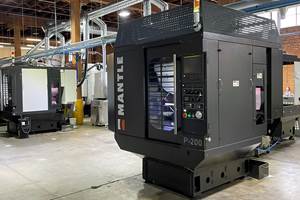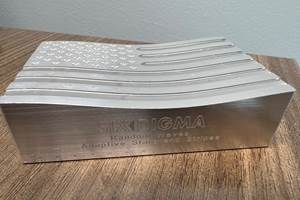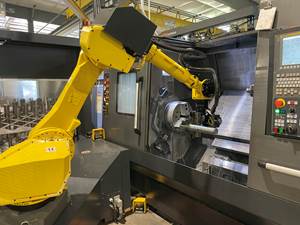Job Shop Finds Its Niche With The Help Of Tapping Machines
The metalworking job shop market can be illustrated as a pyramid. At the base of the pyramid is the largest segment of the discrete parts manufacturing business.
Share





The metalworking job shop market can be illustrated as a pyramid. At the base of the pyramid is the largest segment of the discrete parts manufacturing business. The tip of the pyramid is the most specialized for difficult work.
Because the business that falls on the base of the pyramid is less specialized, it can therefore be manufactured by a larger number of job shops around the world. Of course, we here in the United States have seen how the extreme competition for this business is driving too much of the work to the lowest cost producers, usually located overseas. It’s tough to compete with a 40 percent cost differential.
It is also a fact that the closer one gets to the apex of the pyramid, the more specialized the manufacturing becomes. Fewer businesses are capable of competing within this more rarified manufacturing environment.
To counter this competitive situation, some jobbers are moving their manufacturing and, for that matter, marketing focus up the pyramid. They are going after jobs that fewer competitive shops have the skill set or technology to manufacture.
Moreover, this manufacturing model is also global—it’s not just confined to the United States. Shibata Tekuramu Company, Limited (SBT) (Tokyo, Japan) is an example of a job shop that has survived by finding its place up the pyramid.
Shibata Tekuramu Company has found its niche for survival by specializing in machining magnesium. The shop uses a bank of Brother CNC tapping centers to machine 80,000 to 100,000 parts per month for a variety of industries.
According to Fumio Shibata, president of SBT, “Japan, too, has seen much of its job shop work migrate to China. Those shops that have been able to survive have done so by finding a specialty or niche that the Chinese are less competitive within.”
About 10 years ago, SBT found its niche in the machining of magnesium components for the camera, computer and electronics industries. Its customers include the biggest names in these industries.
The strategy was to make SBT an indispensable source from which these companies would get the critical machining work needed. With a workforce of 34 people, SBT produces 80,000 to 100,000 magnesium parts per month of various types. About 10 percent of that volume is machining of laptop computer covers.
Magnesium is an advantageous material for laptop computer frames, cameras and other personal products, because of its strength to weight ratio. When alloyed with aluminum, it is very machinable and light, as well as strong.
However, magnesium is a very volatile material. The threat of fire is omnipresent, and the shop must take precautions to avoid it. These include some adjustments in the machining process. SBT has learned through experience, having had two fires along the way to establishing its expertise in this niche.
“One important key to machining magnesium,” says Mr. Shibata, “is to keep the machining center clean. Allowing magnesium chips to build up is inviting a potential fire.” Anti-static strips are used at entrances to the shop as well as on the operators’ wrists to ground out potential static electrical sparks.
SBT does its drilling and tapping operations on Brother tapping centers. There are numerous drilled and tapped holes on the laptop frames, most of which are blind. The tapping center uses synchronous tapping reversal and holds tolerances of 0.005 mm on the thin-sectioned magnesium covers. For milling, the machines can generate 16,000 rpm for high speed machining.
The drilling, tapping and milling work is done semi-dry using a misting system and formula that were developed in house. Traditional coolant is not used because magnesium reacts badly with water.
Another technique the shop employs, according to Mr. Shibata, “is the use of modified woodworking tools to do the metal cutting. These are carbide cutters that use a grade developed for wood. The machinability characteristics of magenesium are very similar to wood. These cutters also produce a larger chip . . . reducing fire potential.”
Finding a niche is a survival technique that many job shop manufacturers must consider. Mr. Shibata mentioned that several of his customers tried outsourcing magnesium machining work to less expensive shops. Several unfortunate accidents later, the work was reinstated.
Related Content
In Moldmaking, Mantle Process Addresses Lead Time and Talent Pool
A new process delivered through what looks like a standard machining center promises to streamline machining of injection mold cores and cavities and even answer the declining availability of toolmakers.
Read MoreBuilding Machines and Apprenticeships In-House: 5-Axis Live
Universal machines were the main draw of Grob’s 5-Axis Live — though the company’s apprenticeship and support proved equally impressive.
Read MoreWorkholding Fixtures Save Over 4,500 Hours of Labor Annually
All World Machinery Supply designs each fixture to minimize the number of operations, resulting in reduced handling and idle spindle time.
Read MoreSame Headcount, Double the Sales: Successful Job Shop Automation
Doubling sales requires more than just robots. Pro Products’ staff works in tandem with robots, performing inspection and other value-added activities.
Read MoreRead Next
Setting Up the Building Blocks for a Digital Factory
Woodward Inc. spent over a year developing an API to connect machines to its digital factory. Caron Engineering’s MiConnect has cut most of this process while also granting the shop greater access to machine information.
Read More5 Rules of Thumb for Buying CNC Machine Tools
Use these tips to carefully plan your machine tool purchases and to avoid regretting your decision later.
Read MoreRegistration Now Open for the Precision Machining Technology Show (PMTS) 2025
The precision machining industry’s premier event returns to Cleveland, OH, April 1-3.
Read More























.png;maxWidth=300;quality=90)









